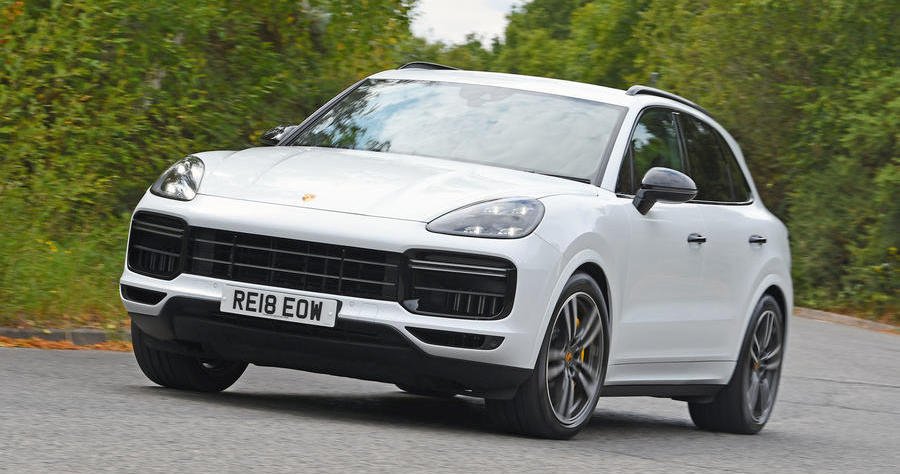Way back in 2003, the very first Cayenne, a plug-ugly two-tonne SUV from the makers of some of the world’s finest and most desirable sports cars, caused a bit of a stir. Those who hated its looks were almost as prevalent as those who rushed to the showrooms to buy one, and it rapidly became Porsche’s biggest seller, as did the second-generation version, launched in 2010.
Unsurprisingly, Porsche didn’t muck around with the formula for this third-generation model, although it did equip the car with new engines, a whole new chassis and a totally overhauled interior.
With some clever use of aluminium in its structure, the Cayenne is lighter than most of its rivals, and allied to that, there’s a range of strong engines: a 3.0-litre turbo V6 in the entry-level Cayenne, a 2.9-litre twin-turbo V6 in the S, a petrol-electric plug-in hybrid (E-Hybrid) and a twin-turbo 4.0-litre V8 in the Turbo.
The entry-level model comes with sat-nav, LED headlights and two-zone climate control. The E-Hybrid and S versions are pricier, but you don’t get a huge amount of extra equipment. The Turbo gets more toys, including air suspension (which is optional on other models), but you’ll pay for it.
Does it drive like a 911? Not really, but performance is excellent. Even the 3.0 V6 can see off the 0-62mph dash in less than six seconds, while the bonkers Turbo model can dispatch 0-62mph in a supercar-fast 4.1sec and go on to 177mph.
Approach a bend and you’ll find that the Cayenne corners very nicely, thank you very much, despite its size. It’s even better on the air suspension, which tightens everything up. It rides pretty well, too, even on steel springs, although there is the occasional thump over potholes and expansion joints. Therefore, we’d recommend you look for a car fitted with air suspension.
Inside, all is leathery plushness, and the driving position is excellent, with plenty of electrical adjustment. Visibility is good, and a rear-view camera is standard. The fit and finish are both first rate as well.
All Cayennes get a giant 12.3in touchscreen in the centre of the dashboard. It has sharp graphics, is responsive to touches and swipes, and rarely has any lag unless you’re zooming in and out of maps quickly.
Space inside is excellent and those rear seats can be slid backwards and forwards as needed for extra practicality. The boot is large and square and easy to access via an electrically operated tailgate.
Prices start at around £53,000 for an early 2018 model. You’ll need a little more to get into the driving seat of an S model, and the E-Hybrid and Turbo versions are rare, so look to spend £60,000 on the former and £80,000-£90,000 on the latter.
BUYER BEWARE
Technology The third generation Cayenne has stacks of gizmos from driving and traction modes to chassis control – check they all work.
Teething problems Owners have reported annoying niggles with the first cars so if you're considering an early one, check everything is in order. Problems have included poor sunroof seals, an inoperable tailgate and CarPlay issues.
Engine Check the oil level because the engine has an appetite for the black stuff. Be sure the major service isn't imminent because it's expensive (not that any are cheap).
Transmission Be sure shifts are smooth and quiet because some owners have reported the opposite.
Lights Check the tail lights for cracks at the edges and other flaws and that the auto headlights work.
Brakes Makes sure the brakes don't squeal and that if they do, that you're comfortable with the noise. One recall concerns the brake warning light not showing the pads are worn.
Need to know
On paper, the most economical model is the petrol-electric E-Hybrid, with official fuel consumption of 72.4mpg. However, it’s unlikely you’ll be able to match that. The 3.0 car is a fraction more economical on paper than the 2.9, but you’ll need access to your own fuel station to keep the Turbo running.
Annual road tax for cars registered after April 2017 is a flat rate, currently £150 a year, but all Cayennes will be subject to a supplementary luxury car tax from years two to six, which is currently £325 a year. Insurance costs will be high for all models, as will servicing bills.
Our pick
Cayenne 2.9 V6 S: We’d seek out an S version, even though it might cost a little more. The main thing you pay for here is the more powerful V6 and the bigger brakes. You also get different 19in wheels and quad round exhaust pipes.
Wild card
Cayenne Turbo V8: Expensive, but it’ll gather up its skirts and give McLarens a run for their money. At the same time, you can put your mother-in-law in the back and the weekly shop in the boot.
Ones we found
2018 Cayenne S, 24,000 miles, £58,950
2018 Cayenne E-Hybrid, 21,000 miles, £61,950
2019 Cayenne Turbo V8, 14,000 miles, £87,500
2019 Cayenne, 4000 miles, £75,950
Related News

